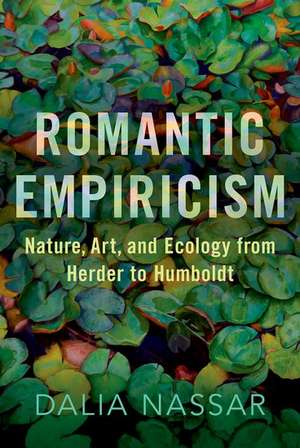Romantic Empiricism: Nature, Art, and Ecology from Herder to Humboldt
Autor Dalia Nassaren Limba Engleză Hardback – 16 aug 2022
Preț: 438.84 lei
Preț vechi: 604.81 lei
-27% Nou
Puncte Express: 658
Preț estimativ în valută:
83.97€ • 89.80$ • 70.01£
83.97€ • 89.80$ • 70.01£
Carte disponibilă
Livrare economică 17-22 martie
Preluare comenzi: 021 569.72.76
Specificații
ISBN-13: 9780190095437
ISBN-10: 0190095431
Pagini: 328
Dimensiuni: 163 x 238 x 25 mm
Greutate: 0.58 kg
Editura: Oxford University Press
Colecția OUP USA
Locul publicării:New York, United States
ISBN-10: 0190095431
Pagini: 328
Dimensiuni: 163 x 238 x 25 mm
Greutate: 0.58 kg
Editura: Oxford University Press
Colecția OUP USA
Locul publicării:New York, United States
Recenzii
A sea change is taking place in the understanding of German Romantic science, and Nassar's study adds significantly to that impulse. She traces the line that originates in Herder's controversial relation with Kant and flows into Goethe and Alexander von Humboldt, giving it a provocative name: Romantic empiricism. Moreover, she highlights the contemporary importance of this line for new ideas in environmentalism and the practice of natural science. All of this I find both cogent and propitious.
Erudite, eloquent, and cogently argued, Dalia Nassar's brilliant new book challenges many engrained assumptions about European romanticism to make a compelling case for both the historical novelty of the romantic empiricism that she identifies in the work of Kant, Herder, Goethe and Humboldt, and of its continuing relevance to current discussions of epistemology and ontology, aesthetics and ethics, corporeality and cognition, affect and judgement, above all with respect to ecological thinking and the urgent global challenges to which it is called to respond. Romantic Empiricism is no less original and important than the new ways of knowing, valuing and engaging with the natural world that Nassar reconstructs within German romanticism. Whatever you think you know about the Romantic period and its historical legacies, this book is bound to make you think again.
Romantic Empiricism offers a new methodology of knowing nature, pairing the observation of phenomena with distinctive cognitive aspects intrinsic to aesthetic processes. This method is also implicated in the text's narrative style that allows readers to follow along in otherwise dense philosophical discussions.
Erudite, eloquent, and cogently argued, Dalia Nassar's brilliant new book challenges many engrained assumptions about European romanticism to make a compelling case for both the historical novelty of the romantic empiricism that she identifies in the work of Kant, Herder, Goethe and Humboldt, and of its continuing relevance to current discussions of epistemology and ontology, aesthetics and ethics, corporeality and cognition, affect and judgement, above all with respect to ecological thinking and the urgent global challenges to which it is called to respond. Romantic Empiricism is no less original and important than the new ways of knowing, valuing and engaging with the natural world that Nassar reconstructs within German romanticism. Whatever you think you know about the Romantic period and its historical legacies, this book is bound to make you think again.
Romantic Empiricism offers a new methodology of knowing nature, pairing the observation of phenomena with distinctive cognitive aspects intrinsic to aesthetic processes. This method is also implicated in the text's narrative style that allows readers to follow along in otherwise dense philosophical discussions.
Notă biografică
Dalia Nassar is Associate Professor of Philosophy at the University of Sydney and a Researcher at the Sydney Environment Institute. Her work sits at the crossroads of the history of German philosophy, environmental philosophy, aesthetics, and ethics. She is the author of The Romantic Absolute: Being and Knowing in German Romantic Philosophy (University of Chicago Press, 2014) and editor of a number of volumes, including, most recently, Women Philosophers in the Long Nineteenth Century: The German Tradition (with Kristin Gjesdal, Oxford University Press, 2021).
